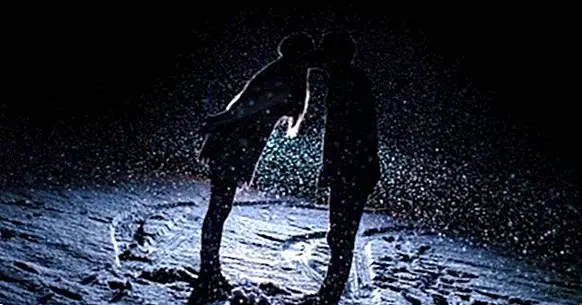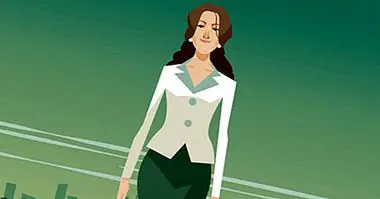Why is it so difficult for us to overcome a sentimental break?
Suddenly, Martin had the feeling that the world was collapsing around him. His girlfriend, the woman with whom he had lived for the last 10 years of his life, had just told him that he no longer wanted him, that he had fallen in love with another man, and that he was leaving home that night.
The feeling of disbelief that gripped Martin at that moment lasted for several days, or even months, after she had left. Distressed and confused, he kept wondering what the hell had happened.
Usually he was wandering alone through the house, submerged in questions and dark thoughts. With time, all kinds of happy moments began to come to his mind , reminiscent of a better time that permanently tormented him: he remembered the smile of his ex-girlfriend, the last time they went on vacation, the walks they did together every weekend around the neighborhood park, the hugs and gestures of affection that they professed mutually, the exits to the cinema and the theater, the shared humor, and a whole cataract of etceteras that projected before their eyes like a movie, again and again.
Also, I often had the feeling that she was still at home. He could smell her, see her standing by the window in the living room, and he heard her boyish laughter echoing, now in his sad and desolate abode.
She was no longer there, but she had become a very present ghost that chased him wherever he went. This was the story of Martín. Now I am going to tell another case, very different and very similar at the same time.
Sentimental ruptures and losses
Just as Martin lost his girlfriend, Diego lost a part of his body . He had suffered a serious car accident that led to emergency surgery where doctors had no choice but to amputate a hand.
The curious thing, and leaving aside the sad and dramatic part of the story, is that in the days and months following the operation, Diego felt that the hand that had been removed was still in place.
He knew rationally, of course, that he was now one-armed. In fact, he could contemplate the nothingness itself where his hand had been before. The evidence before his eyes was irrefutable. But, despite that, Diego could not help but feel that the injured hand was still in place. Moreover, he assured doctors that he could move his fingers, and there were even days when his palm itched and he did not know what to do to scratch himself.
The strange phenomenon that affected Diego has a name ... it is known as the phantom limb syndrome. It is a well documented pathology that, like everything that happens to us in life, has its origin in the architecture of the brain.
The ghost member
Every part of our body occupies a specific place in the brain. The hands, fingers, arms, feet and the rest of the components of the human anatomy possess a specific and identifiable neuronal correlate. In simple terms, our complete organism is represented in the brain, that is, it occupies a specific space made up of a set of interconnected neurons.
If misfortune stalks us and we suddenly lose a leg in an accident, what disappears from our body, instantaneously, is the real leg, but not the areas of the brain where that leg is represented.
It is something similar to what happens if we take a page from a book: that particular sheet will no longer be part of the volume in question; however, it will continue to exist in the index. We are here before a gap between what we are supposed to have and what we really have .
Another way of understanding it is to think about the real geographical territory of a country and its cartographic representation, that is, the place that country occupies on the world map ... A giant tsunami could well cause Japan to sink into the ocean, but evidently Japan would continue to exist in all the school maps scattered on the face of the Earth.
Analogously, if from one day to the next, the unfortunate Diego no longer has his right hand, but for his brain continues to exist, it is expected that the poor boy feels that he can take things with the missing member, play with his fingers, or even scratching his butt when nobody is looking at him.
The brain that adapts
The brain is a flexible organ, with the capacity to reorganize itself. For the purposes of the case before us, this means that the area of the brain where Diego's injured hand was previously located does not die or disappear.
Quite the contrary, with the passage of time, when you stop receiving sensory information from the environment, such as touch, cold and heat, the nerve cells stop fulfilling their specific function.As there are no longer any reasons for them to remain there, as their existence is not justified, the unemployed neurons are placed at the service of another member of the body. Usually, they migrate to neighboring regions of the brain. They change equipment, to put it in colloquial terms.
Of course, this does not happen overnight. The brain takes months and years for such a feat. During this period of transition, it is possible that the injured person lives cheated , believing that there is still something where in reality there is nothing.
The parallelism
However, What does the syndrome of the strange hand have to do with poor Martin and his fugitive girlfriend who give title to this article?
Well enough, in a certain sense, since not only our different parts of the body have a physical representation in the brain, but also everything we do during the day, our most diverse experiences.
If we take Czech language lessons or play the clarinet, the resulting learning triggers the literal reorganization of some regions of our brain. All new knowledge involves the recruitment of thousands and thousands of neurons so that this new information can be fixed and conserved in the long term.
The same is true for Clarita, the woman with whom Martín lived. After many years of courtship and dozens of experiences together, she occupied a very specific place in the brain of man, just as the lost hand occupied a specific place in Diego's brain.
Extirpada the hand, and extirpated Clarita, both brains will need time to adjust to the new circumstances ; clinging to the past, they will only bombard two boys with illusory flashes of a reality that no longer exists. Thus, while Diego feels that he still has his hand, Martín feels Clarita's presence, and both suffer damned before the strong emotional contrast that is generated every time they become aware that it is no longer so.
The problem does not end there
There is an aggravating factor, and it is the feeling of discomfort that appears when the old accustomed brain can not get what it wants.
When a person dazzles us, the central nervous system begins to release large amounts of a substance called dopamine. It is a neurotransmitter whose function, in this case, is to stimulate what is known as the reward circuit of the brain, responsible for the feeling of well-being and fullness that characterizes the lover .
On the other hand, the excess of dopamine circulating through our neurons blocks a region called the prefrontal cortex that, coincidentally, is the biological seat of reflexive thinking, critical judgment, and the ability to solve problems. In other words, when we fall in love, the possibility of thinking and acting intelligently goes to the seventh circle of hell, and beyond.
Blinded and stunned by love
Falling in love leaves us dumb, and that responds to an evolutionary end. Blind of love, not being able to perceive the defects of our partner helps to quickly strengthen the bond. If the person in question impresses us it seems perfect, without negative features, it will make us want to spend a lot of time with her, which in turn will increase the likelihood that we will end up in bed, have children, and continue to populate the world. That, by the way, it's the only thing that really interests our genes .
However, if for some reason the relationship is interrupted permanently, the reward circuit is deprived of its source of dopamine, which triggers a true withdrawal syndrome. Instead, the stress circuit is activated, and the lover suffers as a prisoner because he can not obtain what his brain insistently demands of him.
As an alcoholic or a drug addict in recovery, the abandoned girlfriend or boyfriend may even end up committing all kinds of imprudence and nonsense in order to recover his beloved or loved one.
The period it takes the brain to rearrange itself to this mess is what is commonly called mourning , and it is usually variable from one person to another, since it depends on the type and intensity of the bond, the attachment and the importance that we attribute to the one we have lost.



















